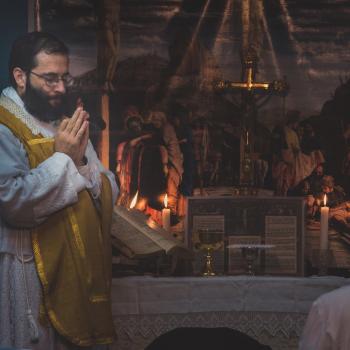
This month, I was asked to prepare the homilies for a priest’s publication, Homiletic and Pastoral Review. For my readers, I will post the model text each week. Here’s the one for this Sunday on the Gospel of the woman caught in adultery. (As a note, some parishes will read the raising of Lazarus – Year A – and that is allowed.)
The Gospel is the woman caught in adultery. You can find the full readings here. The homily I propose is:
Have you ever felt beyond God’s mercy? You did something wrong and you can’t even imagine God would forgive you. Maybe it was the first time you became aware of a sin as a kid: you went and snuck a popsicle from the freezer and can’t imagine mom will every forgive you.
We’ve all been there at some point. We’ve reached our wits’ end.
[The Gospel Story From the Woman’s Perspective]
Today’s Gospel gives us an example of someone like this but it also gives us Jesus’s merciful response. The scene begins with a bunch of men ready to stone her. She knows how the law of Moses treats her crime. It says, “You shall bring them both out to the gate of the city and there stone them to death” (Deut 22:24). Thus, she expects no reprieve. She figures all is lost. She assumes her sin is unforgiveable.
Yet these men move and ask Jesus a question before the stone her. They want to trick Jesus. They know Jesus is merciful but they also know Moses’s law is above all else among the Jews. They ask him, “Now in the law, Moses commanded us to stone such women. So what do you say?”
Jesus bent down and started writing on the ground. If we imagine ourselves in the place of the woman, we are probably nervous at this point, wondering when the first stone is coming. We hide our face, too afraid to even look. But, Jesus writes calmly on the ground, then tells them they can cast stones. However, he gives a caveat: they must be without sin. Surely, we think as the woman there, we compare ourselves to the men with the stones. Compared with us, these men are sinless. It will be seconds before the stones start piling on.
But the rocks never come. You’re in shock, and wondering what has happened. Then, after sitting crouched in the corner1 for a while, you look up. There is Jesus, who offers you a hand up. He then says, “Has no one condemned you? . . . Neither do I condemn you. Go, and from now on do not sin anymore.”
[This Is Like Going to Confession]
This experience is much like the experience we have when we fall and go to confession. We’ve done something we know is wrong and our conscience eats away, condemning us. Then, we fear confession. We think, “Oh, no, how could I ever say that to the priest?” Trust me, even we priests have this experience: for us it’s going to our fellow priests who are often our friends or former classmates.
But then, when we go to confession, we experience the overflow of God’s abundant mercy washing over our souls.
God’s mercy is so strong that some early Christians actually skipped this passage in their Bible as they were scandalized by it. They didn’t think God’s mercy could be so abundant. But we know it can be. In fact, when we look to the other passages the Church gives us this week, we can see them as celebrations of this abundant forgiveness we receive in confession.
The second reading from the Letter to the Philippians states, “I consider everything as a loss because of the supreme good of knowing Christ Jesus my Lord.” Knowing Jesus is not a pure intellectual exercise. We know him as a person. But you know what creates the biggest obstacle to this? Sin. Thus, if we are to have such a transforming knowledge that we would give all else up, we need to be cleansed of sin, we need to go to confession.
[Great Things God Does in Us]
This week’s Psalm has the verse: “The Lord has done great things for us; we are filled with joy.” When we dig into the verses, we see a lot of times where God, through his mercy, took the Israelites from sorrow to joy. We even see one that is another model for confession: The Israelites were captive in Egypt, then God brought them out through difficult trials. Likewise, before confession we are often captive in our sin and God can bring us out of that, with far fewer trials than the Israelites.
The woman caught in adultery is a lot like us when we sin. We think all is lost, we think Jesus will be mad, but, if we go to confession, we freely receive God’s healing balm. We are cleansed by his wonderful mercy. I want to invite you all to go to confession more often, even in these two weeks before Easter if you haven’t been for a while.
I hope that fed you spiritually and inspired you to go to confession. We have sinned like the woman caught in adultery, but that means we can also be forgiven like her.












